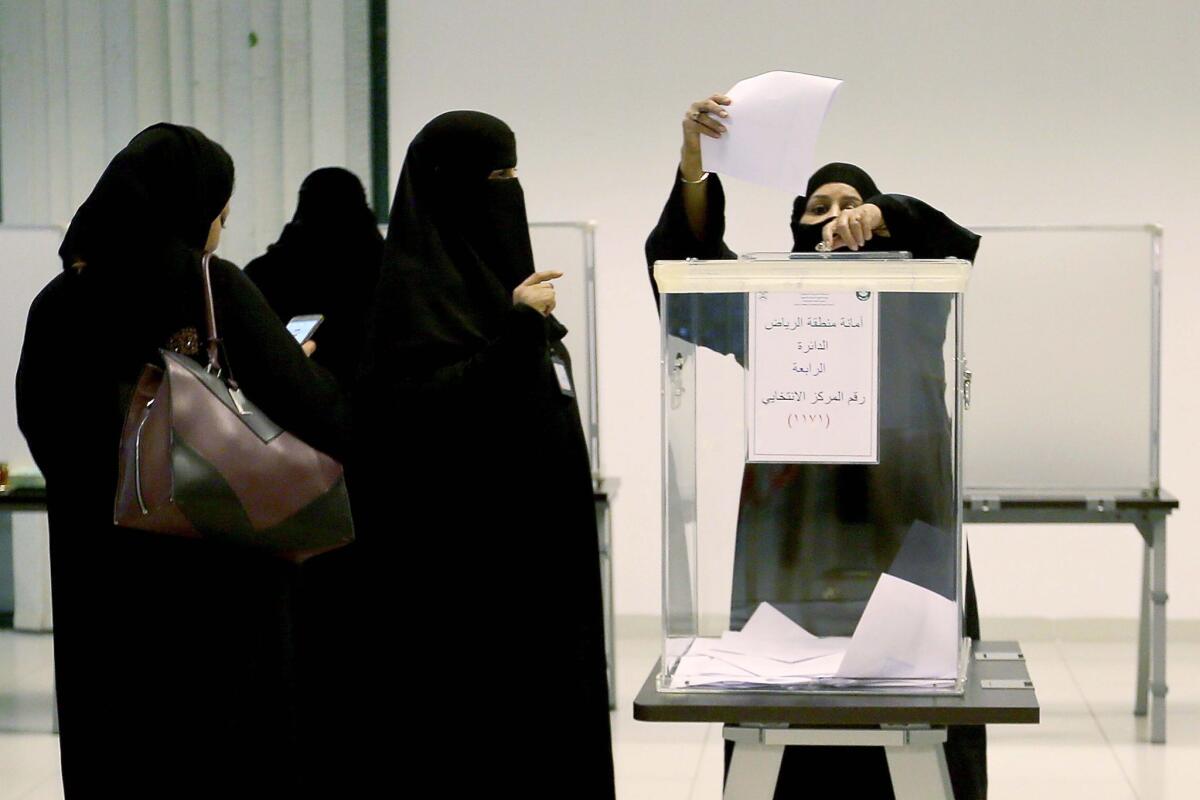Editorial: Saudi Arabia should end male guardianship and let women drive

Saudi women cast their votes in the kingdom’s municipal elections in Riyadh on Dec. 12.
- Share via
When the rulers of Saudi Arabia allowed women to run for municipal offices and vote in the elections last weekend, the desert kingdom took a small but historic step into the era of gender equality, catching up to its Middle Eastern neighbors who had already given women the right to vote and losing the distinction of being the only country on Earth where men hold the franchise exclusively.
Still, this is the most nascent of reform movements. After all, women arrived, swathed head to toe in abayas and hijabs, at gender-segregated polling places, and left in cars necessarily chauffeured by men. There’s no question that giving women the right to run for office and vote is symbolically important, but the country’s elections extend little power to any voters, male or female. (Authority stays with the ministries.) Meanwhile, Saudi Arabia remains one of the most repressive countries in the world in terms of human rights overall and women in particular.
Saudi Arabia remains one of the most repressive countries in the world in terms of human rights overall and women in particular.
Under the country’s conservative interpretation of Islam, women must cover up in public and are not allowed to drive. Some women — including one who ran for office — have publicly defied this law and were jailed. Most oppressively, Saudi women are governed by male guardians, who must grant permission before they can obtain a passport, marry or attend college.
The government has pledged to abolish male guardianship, but that has yet to happen. Legally, women can work without a guardian’s approval — but some employers require it anyway. These rules are deeply ingrained in Saudi culture, and the pace of change is glacial.
It’s time, not just culturally but economically, to lift these restrictions. More Saudi women than men are getting college degrees, but less than a quarter of them work in the country. Making sure that women have access to jobs and their own means of getting to them — by driving a car — not only offers them the independence that should rightfully be theirs, but helps boost family incomes and the overall economy, whose growth has cooled significantly.
It was the late King Abdullah who promised in 2011 that women would be allowed to participate in elections this year, and King Salman, smartly, kept that promise. Building on the success of the elections (women didn’t just run for office — some of them won), the Saudi government should see this as the time to push further with reforms. It should repeal male guardianship laws and the edict against women driving. These changes are a matter of protecting human rights, and not coincidentally, they make social, cultural and economic sense.
Follow the Opinion section on Twitter @latimesopinion and Facebook
More to Read
A cure for the common opinion
Get thought-provoking perspectives with our weekly newsletter.
You may occasionally receive promotional content from the Los Angeles Times.









